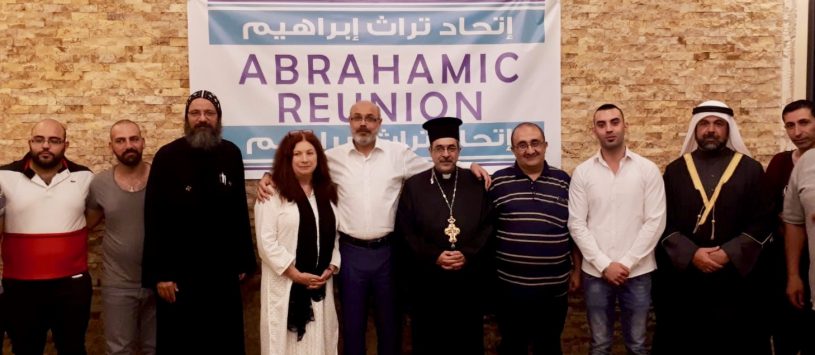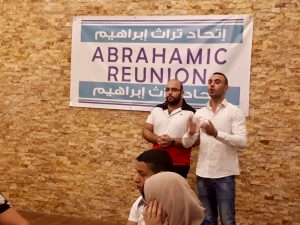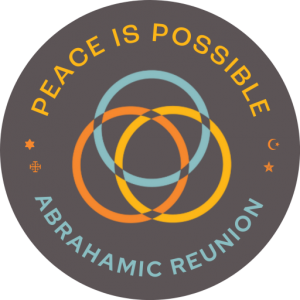
JERICHO, PALESTINE
June 8th, 2018
I am sitting in the car with Abed, the Abrahamic Reunion’s Project Manager in the Holy Land, as he drives us from Nazareth to Jericho. It is about an hour and half drive. As we ride along, he explains that we are only about an hour from Damascus, Syria, and also only an hour from Lebanon. He points to the nearby hills and tells me, “That is Jordan.”
After we cross the checkpoint into the West Bank, there is a small valley between the road we are on and the Jordanian hills. The houses in Jordan are so close that I can easily see the laundry hanging on the balconies of the homes as we drive by. I’m amazed at the absence of any type of visible boundary between the two countries. Then Abed explains that the small valley between the road we’re on and those houses is lined with land mines.
I am grateful that the U.S. is not considering mining our border with Mexico. Then Abed explains that maintaining a national boundary with land mines is illegal everywhere in the world. “But,” he says, “many countries in this region can get away with it because of the war in Syria.”
As we continue driving, I sit quietly, absorbing what it must feel like to live so close to an invisible fence made of bombs.
Finally we arrive at the restaurant in Jericho where Abed and Mohamad Jamous, the Abrahamic Reunion’s Palestinian Director, have arranged for the first Abrahamic Reunion Iftar in the West Bank.
I want to tell you a little about Mohamad Jamous. In the past, we normally obtained permits for Palestinians to enter into Israel so they could participate in programs there. But as the situation along the Gaza border escalated, it became difficult for NGO’s to obtain permits. Fortunately for the Abrahamic Reunion, a Palestinian woman in the U.S., whose family emigrated there as refugees, began donating to the Abrahamic Reunion in 2017, specifying that we use her donation to support a Palestinian peacemaker. We decided to allocate her donation to Mohamad Jamous, and since that time, this dedicated young man has arranged different programs throughout the West Bank for up to 200 people each month. He does this work on a very limited salary of only $500 per month. It is not a living wage, and we hope to receive more donations to enable us to raise his salary soon. (A minimum salary for this work would be at least $2,000 per month.)
When we arrive at the restaurant where the Iftar will be held, we see a large banner outside for the Abrahamic Reunion, written in Arabic and in English. The private banquet room is made of stone and has stained glass windows. There are six large round tables with twelve place settings at each table.
 This year, the Abrahamic Reunion received enough donations to host 70 people for its first Iftar in the West Bank. Mohamad Jamous said he could have easily invited over 200 people from among the participants at his monthly Abrahamic Reunion events. In the future we hope to raise the money to host such a large program.
This year, the Abrahamic Reunion received enough donations to host 70 people for its first Iftar in the West Bank. Mohamad Jamous said he could have easily invited over 200 people from among the participants at his monthly Abrahamic Reunion events. In the future we hope to raise the money to host such a large program.
A beautiful buffet is laid out for our group.
Our eminent speakers are seated at a table together. They include:
- Father Firas Diab – The Melkite Catholic Priest from the Melkite Greek Catholic Church of Zababdeh, Palestine
- Father Pachomius- The Egyptian Coptic Priest from the Egyptian Coptic Church of Jericho
- Sheikh Imad Abu El Shalabya- the Imam of Masjid Al Zababdeh in Zababdeh, Palestine
- Sheikh Ghassan Manasra- Sheikh of the Qadiri Sufi Order in Israel and International Director of the Abrahamic Reunion
- Mohamad Jamous – The Palestinian Director of the Abrahamic Reunion
- Sheikh Abed Manasra – Project Manager for the Abrahamic Reunion in the Holy Land
 The majority of people attending this event are Muslim (only 12 percent of Palestinians are Christian), and they applaud and cheer as the speakers affirm God’s love for humanity over His love of religion.
The majority of people attending this event are Muslim (only 12 percent of Palestinians are Christian), and they applaud and cheer as the speakers affirm God’s love for humanity over His love of religion.
I ask people how the situation in Gaza is affecting them in Jericho. A young woman says:
We are one. When things are bad there, it makes it very hard for us here also. Also we feel it. We are not separate. We are one people.
 They ask me about my life in America and are fascinated when I explain that we have spiritual center in Florida that not only has Sufi classes and a weekly Zikr, but is also used for yoga classes, and that a Jewish congregation also used our center as a venue for its services when it was first getting established in our city.
They ask me about my life in America and are fascinated when I explain that we have spiritual center in Florida that not only has Sufi classes and a weekly Zikr, but is also used for yoga classes, and that a Jewish congregation also used our center as a venue for its services when it was first getting established in our city.
When I explain that people from all different spiritual traditions, including Native Americans and Buddhists and others, use our spiritual center for their activities, it is as if I’m describing a wonderful dream that they can only barely imagine. We in the U.S. take such things for granted, but here they are only a very distant possibility.
It made me recognize that the Abrahamic Reunion’s commitment to using religion as a force for peace, and to providing activities that bring together multi-faith communities in the West Bank, is a powerful and brave affirmation. This is particularly so when less than an hour away, Syrian refugees, and second and third generation Palestinian refugees, are fleeing a war in Syria that has used religion to terrorize the entire world.

As we prepare to leave, people from the audience and the presenters come forward to shake our hands and hug us. They ask us to continue this “great work.”
It warms my heart when some of them ask us to host the Iftar near Nabulus next year so they can invite the Samaritans to join us.
The Samaritans believe that their religion, which is based on the first five texts of the Hebrew Bible, is the true religion of the ancient Israelites. They believe that the Hebrews who remained in the Land of Israel during the Babylonian Exile preserved Samaritanism. They see Judaism as a related but altered religion, brought back by the Hebrews who returned from the Babylonian Captivity in the late 7th century BCE.
The Samaritans regard Mount Gerizim (near Nablus), the site of Abraham’s near-sacrifice of his son Isaac, as their sacred center, and have lived on and around that mountain since ancient times.
No one mentions working with the Israeli settlers in the West Bank. They know to break this taboo could be life threatening.
After the Iftar we go to Mohamad Jamous’s home to continue talking, and to gain a deeper understanding of the conditions this brave young man is working under.
His family gathers around, and as we sip lemonade and coffee we discuss future possibilities for the Abrahamic Reunion in the West Bank.
It is nearly 2:00 AM as we drive towards the checkpoint that separates the West Bank from Israel.
The dark roads are nearly empty, but at one point we pass a string of about 30 cars revving their engines. None of them have Palestinian license plates. The people inside are shouting and partying, and music booms from their radios. They flick cigarettes from their car windows.
As his baby daughter sleeps in the back seat of our car, Abed points out the Maserati’s and Ferrari’s and other expensive cars we are passing. It is the largest collection of such cars I have ever seen. Abed explains that where there is oppression, there is a lot of money to be made.
Once again I grow quiet as we drive past the “wall” of buried bombs to my right and the Maserati’s and Ferrari’s with foreign license plates to my left, and I think of Ghassan’s reminder to me: “When it is very dark, don’t curse the darkness, light a candle.”
Please support the work of the Abrahamic Reunion in the Holy Land.



